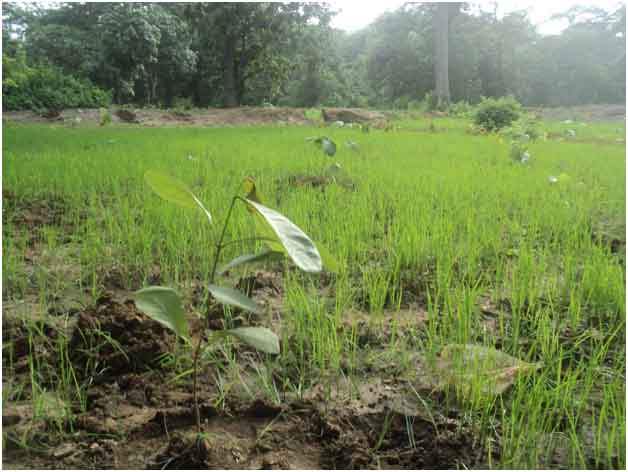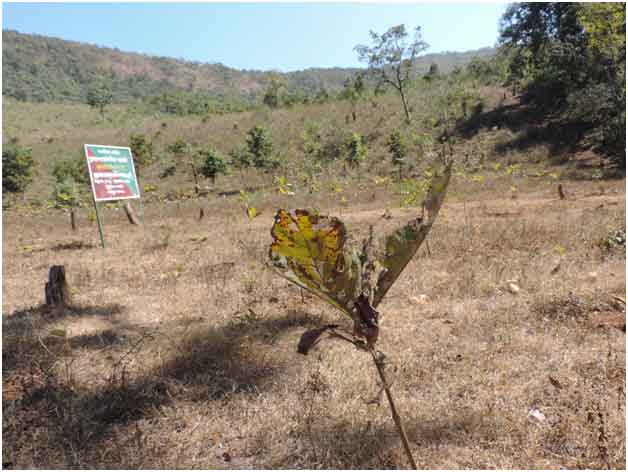Perpetuating Deprivation And Injustice: Plantation Programs In Violation Of Forest Rights Act
By Sanghamitra Dubey
09 August, 2015
Countercurrents.org

Teak plantation in agricultural land,Khaprakhol block , in Bolangir district Photo by ,Manohar Chauhan
In parts of Khammam district in Telengana, massive plantations are being carried out on podu (shifting cultivation) fields under the Haritha Haraam Afforestation scheme of the state government without recognizing the rights of the cultivators under the Forest rights Act (FRA). This is in violation of FRA by the plantation and forestry departments of the state. We are reporting this on the eve of International day of the World’s Indigenous people 9th August.
There are some specific cases found in Kandhamal and Bolangir districts of Odisha where massive plantation program(Teak, rubber, tissue culture banana , etc) is carried out by the forest department convergence with MGNREGA over the forest land and podu land. The plantations are done in cultivable land of the right holders. As per the Forest Rights Act (FRA) the Gramsabha has every authority to take decision about their forest and land but these plantations program are implemented without taking consent of the Gramsabha/community In many cases the plantation programs are implemented in active collaboration with or through the tribal welfare departments and the integrated tribal development agencies which is defeating the very purpose of the tribal welfare department as well as violating the spirit of the Forest rights Act.

Teak plantation over podu land, Tumdibandh block, Kandhamal district, Photo by, Rana Roy and Ranjeeta Patnaik
Scope under Forest rights Act :
The rights recognized and vested under the Forest Rights Act, 2006 include rights over forest land for occupation and cultivation, community forest resource rights, community rights of particularly vulnerable tribal groups (PVTGs) over their habitat, rights of nomadic and pastoralist communities. The law guarantees protection of rights of forest dwellers while the recognition and vesting is going on (protective clause under section 4 (5) of the Act). The ministry of tribal affairs in its guideline and letters issued to the State governments has further instructed that the State Level Monitoring Committee needs to ensure implementation of Section 4 (5) in letter and spirit to prevent possibility of violation of rights of the STs and OTFDs. The law further empowers the Gram Sabhas to protect, conserve and manage the community forest resources for which the MoTA has laid out detailed guidelines. As per the guidelines community forest resources constitute a new category of forest area which is to be recorded as ‘CFRs’ in the record of rights (RoRs). Under Section 3 (1)(i) and Section 5 the legal rights and authority for conservation and management of CFRs is vested with the Gram Sabha.. Consent of the Gram Sabha is therefore a legal requirement to be compiled while proposing any government interventions in the forest land and community forest resources recognized under the FRA.
What is happening in Kandhamal and Bolangir districts is blatant violation of Forest Rights Act
MoEFF&CC guidelines (Green India Mission and CAMPA through MGNREGA) contradicting FRA
http://envfor.nic.in/major-initiatives/national-mission-green-india-gim
The convergence guidelines issued by MoEFF&CC (Green India Mission and CAMPA through MGNREGA) is again contradicting the intent of the Forest rights act as its mandate is to do afforestation and covered 10mha land in next five to ten years .
CSOs Voice:
The tribal communities are loosing their traditional species because of these intervention, and after recognition of Rights the land belongs to the Community only , looking at these issues Civil society Organizations & activist across the country have voiced their concerns and demanded urgent interventions by sending petition to the Ministry of tribal affairs, Ministry of environment forest & climate change, and Ministry of Tribal affairs on the eve of International Indigenous people’s day .
Sanghamitra Dubey is based at Bhubaneswar and working as a Researcher with Vasundhara. I would like to thank Tushar Dash, Subrat kumar Nayak , Ranjeeta Pattnaik, and all the Vasundhara staff for the support and Information
Comments are moderated



